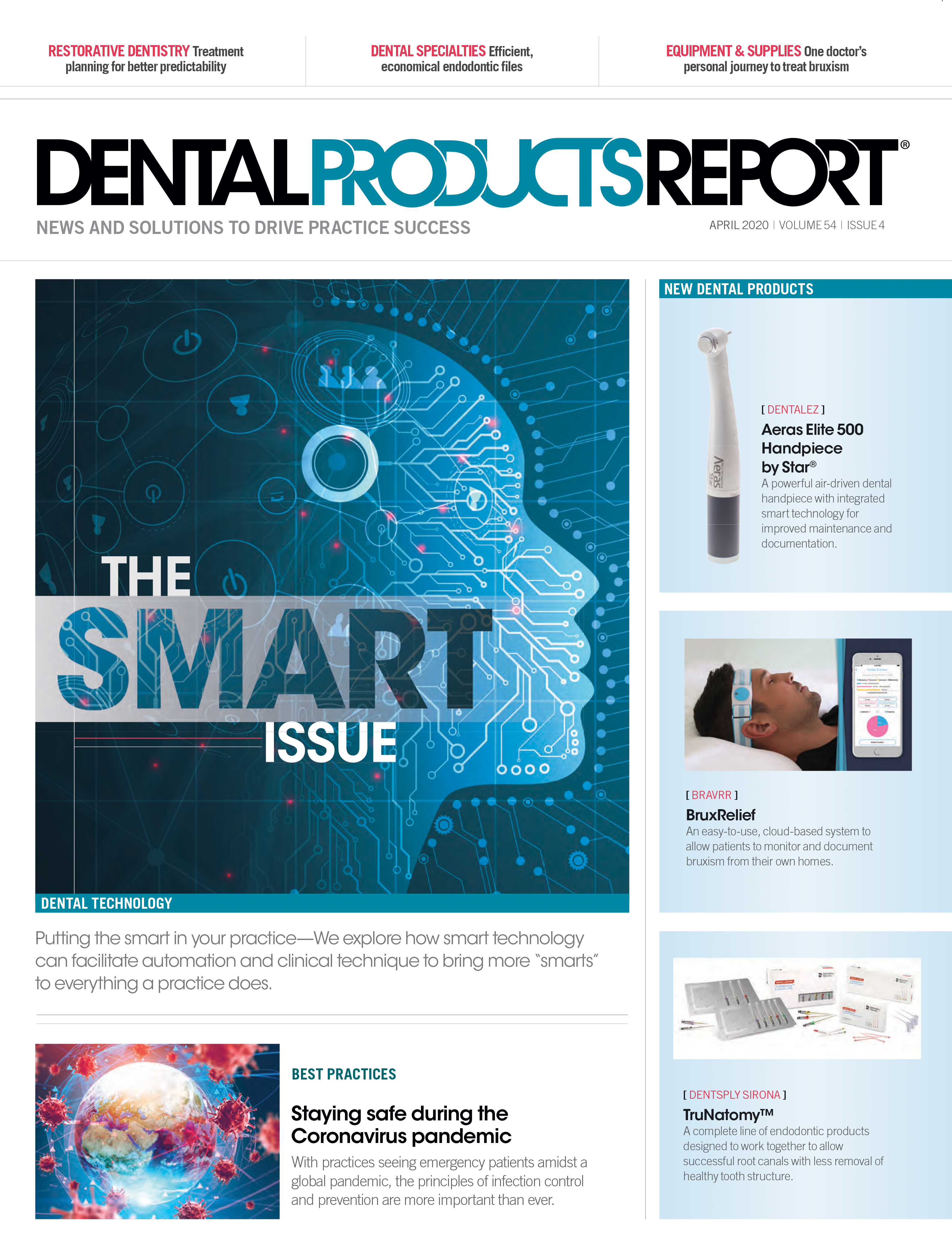Oral Care Probiotics Supplement Overall Health Practices
Strains of beneficial bacteria can help balance the oral environment and promote patients’ oral and overall health.

A frustration shared by many dentists and dental hygienists is seeing patients who, despite reporting good oral hygiene practices, present with cavities, periodontal issues and/or persistent bad breath.
Traditional methods of home care such as brushing and flossing are met with great resistance and multiple excuses for why these habits are difficult to incorporate into the daily routine. The good news is that alternatives are available, and oral care probiotics are one such option. Multiple scientific research studies conducted over the past three decades validate the efficacy of oral care probiotics as an effective means of fighting these all too common oral health issues.
With healthcare moving into a more holistic direction and antibiotic resistance becoming a reality, the suggested effects of probiotics in the oral cavity can be broadly divided into three groups: Modulation of the host inflammatory response, direct effect against pathogenic bacteria, and indirect effect against pathogenic bacteria. For the dental practitioner, oral care probiotics may be useful for the treatment of caries, halitosis, periodontal disease, and oral mucositis.
What are probiotics?
Oral care probiotics are live, healthy bacteria that are identical to the beneficial microorganisms found naturally in the mouth. They should include organisms that naturally occur in the teeth, tongue, and gingival tissue including S. oralis, S. uberis, and S. rattus. A key goal of their use is to interfere with microbial imbalance, a causal agent in caries, and periodontal diseases, by adding beneficial bacterial species.
By attaching to natural oral biofilm and forming live, active bacteria on the surface of the teeth and deep into the sulcus, probiotics reduce oral pathogens often exacerbated by processed foods and high-sugar diets. They can also reduce or prevent plaque biofilm formation and gingivitis, often associated with health problems beyond the mouth.
According to the Centers for Disease Control and Prevention, by age 34, approximately 50 percent of people will have experienced periodontal disease.1,2 Additionally, poor oral health has been linked with other chronic diseases, such as diabetes, heart disease, dementia, and Alzheimer’s disease.3
Oral-systemic connection
The findings linking oral and systemic bacteria are helping to shift the paradigm of dentistry from curative to preventive. This approach may offer life-changing benefits for patients, especially those with potential risk for heart disease. Collaborative treatment efforts between the Heart Attack and Stroke Prevention Center (HASPC) of Central Ohio and Complete Health Dentistry of Columbus, two practices located in the same office in Worthington, Ohio, have shown positive results in preventing heart attacks and strokes. One of their main focuses is to reduce inflammation through using oral probiotics to eliminate high-risk bacteria in the mouth, which can enter the blood stream causing an inflammatory load.4
“Our patient protocol includes testing, treating, and repopulating,” says Lora Hooper, B.S.D.H., RDH, EFDA, part of the oral care team at HASPC of Central Ohio and Complete Health Dentistry of Columbus. “I feel the most important piece is repopulating, which is centered on creating a healthy oral microbiome by repopulating with beneficial bacteria in the mouth. During my 25 years of patient care, I have seen a dramatic improvement of oral health in patients using oral care probiotics.”
Dental benefits for children
An ongoing study conducted by pediatric dental expert Mark Cannon, DDS, MS, of the Feinberg School of Medicine at Northwestern University in Chicago, concludes that an oral care probiotic regimen significantly reduced both the caries risk and the levels of cariogenic dental bacteria in caries-prone children, with no reported side effects.5 The reduction in caries risk for the pediatric study group remained clinically significant three years after the original study.6,7
This data supports use of oral care probiotics in preventive dentistry to reduce both the number of pathogenic dental bacteria and the long-term caries risk in children. “Dental professionals should consider oral care probiotic therapy as one of the most effective caries preventive measures in children,” says Dr. Cannon.
Dental health for the future
The addition of oral probiotics to an oral care regimen can restore the natural balance of beneficial bacteria, which can be depleted by poor nutrition, stress, medication, illness, and other factors. The use of probiotics in patients’ daily oral care regimen following routine prophylaxis or nonsurgical periodontal therapy has the potential to alter the microflora present in the mouth.8
The introduction of beneficial bacteria strains in the oral cavity can crowd out recolonization of unhealthy bacteria, including those that can cause bad breath. Additionally, oral probiotics may support tooth and gum health as well as whiten teeth. Oral care probiotics are a promising treatment option that may offer long-term improvements in oral care-something we can all smile about.
Where Probiotics Can Help
Oral care probiotics are not a part of the majority of patients’ oral care routines, but a growing body of research shows they can be effective for many people. While more research is needed, many studies show the promise of probiotic solutions to common oral and systemic health problems. Here are some of the situations where oral care probiotics have been shown to help:
- Reducing oral plaque and caries – Evidence demonstrates that certain beneficial strains of oral care probiotics can reduce the formation of oral biofilm and interfere with the growth of caries causing pathogens
Huang X et al. A highly arginolytic streptococcus species that potently antagonizes streptococcus mutans. Appl Environ Microbiol. 2016; 82 (7): 2187-201.
- Reducing oral inflammation – It has been shown that the use of some probiotics can reduce or eliminate inflammation of the gums caused by periodontal disease or other causes
Riccia DN et al. Anti-inflammatory effects of Lactobacillus brevis (CD2) on periodontal disease. Oral Dis. 2007; 13(4): 376-385.
- Managing gingivitis and reducing bleeding from gums – A study found a specific strain decreased the gingival index for some patients
Krasse P et al. Decreased gum bleeding and reduced gingivitis by the probiotic Lactobacillus reuteri. Swed Dent J. 2006; 30 (2):55-60.
- Eliminating bad breath – A study looking at using oral probiotics to fight bad breath found efficacy where specific probiotic strains were able to prevent some VSC emitting bacteria from colonizing
Burton J, Chilcott C, Moore C, Speiser G, Tagg J. A preliminary study of the effect of probiotic Streptococcus salivarius K12 on oral malodour parameters. J Appl Microbiol. 2006; 100: 754-764.
- Reducing candida growth and preventing oral thrush – Evidence has shown probiotics offered effective methods in older adults for reducing the colonization of candida in the oral cavity
Kraft-Bodi E et al. Effect of Probiotic Bacteria on Oral Candida in Frail Elderly. J Dent Res. 2015; 94 (9 suppl): 181S-186S.
- Reducing the risks of oral-systemic linked conditions such as heart disease – With a growing body of evidence linking oral conditions with overall health, and specifically with heart health, evidence demonstrates oral probiotics can be a possible approach to help in this area
Saini R, Saini S, Sharma S. Potential of probiotics in controlling cardiovascular diseases. J Cardiovasc Dis Res. 2010; 1(4):213–214. doi:10.4103/0975-3583.74267
- One study even shows promise as a way to fight oral cancer – While much more research is needed to see if this is true for humans, a 2013 study found a strain of probiotic bacteria was able to inhibit oral cancer in rats
Zhang M et al. Lactobacillus Salivarius REN Inhibits Rat Oral Cancer Induced by 4-Nitroquioline1-Oxide. Cancer Prev Res. 2013; 6 (7):686-694.
References
1. Centers for Disease Control and Prevention. Periodontal Disease. https://www.cdc.gov/oralhealth/conditions/periodontal-disease.html . July 10, 2013. Accessed March 6, 2020.
2. Eke PI, Dye B, Wei L, Thornton-Evans G, Genco R. Prevalence of Periodontitis in Adults in the United States: 2009 and 2010. J Dent Res. 2012; 91(10):914-20.
3. Oral health: A window to your overall health. Mayo Clinic. https://www.mayoclinic.org/healthy-lifestyle/adult-health/in-depth/dental/art-20047475. June 4, 2019. Accessed March 6, 2020.
4. Gould E, DeMatteis P. Collaborating to Reduce Oral-Systemic Inflammation. Inside Dentistry. 2019; 13(12):47-52, 59.
5. Cannon M, Trent B, Vorachek A, Kramer S, Esterly R. Effectiveness of CRT at Measuring the Salivary Level of Bacteria in Caries Prone Children with Probiotic Therapy. J Clin Pediatr Dent. 2013; 38 (1): 55-60.
6. Cannon M, Vorachek A, Le C, White K. Retrospective Review of Oral Probiotic Therapy. J Clin Pediatr Dent. 2019; 43(6): 367-371.
7. Cannon ML. A Review of Probiotic Therapy in Preventive Dental Practice. Probiotics Antimicrob Proteins. 2011; 3(2): 63-7
8. Naekaerts O, Jacobs R, Quirynen M et al. Replacement therapy for periodontitis: pilot radiographic evaluation in a dog model. J Clin Periodontol. 2008; 35(12): 1048-52.
